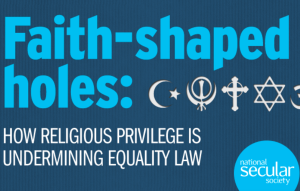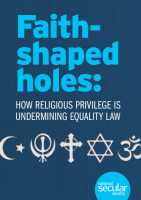Bigotry based on the idea of 'caste' has no place in modern Britain.
We want to see those at risk of caste discrimination protected by UK law.
'Caste' systems are rooted in ancient religious and cultural beliefs. They are imbued with inequality and discrimination, and are wholly incompatible with human rights.
There are an estimated 50,000 – 200,000 people in the UK who are regarded by some as 'low caste' (sometimes known as 'dalits') and at risk of caste discrimination. There is evidence of caste-based discrimination and harassment present in employment, education and in the provision of services.
Caste-based prejudice and discrimination is a gross violation of human rights and must not be tolerated. All individuals have the right to protection against discrimination on the basis of their caste or perceived caste, in the same way that they do on the basis of race or gender
Our equality laws do not explicitly deal with the issue of caste, meaning victims of caste discrimination have to use unclear and precarious case law to secure justice. Both parliament and the United Nation Human Rights Council have called on the government to explicitly outlaw caste-based discrimination, but it has delayed doing so for years.
It's time to outlaw caste discrimination.
Take action!
1. Have you experienced caste discrimination? Report it!
The Dalit Solidarity Network's "everyday casteism" campaign is cataloguing instances of casteist behaviour, including incidents of discriminatory or caste hate speech behaviour, experienced on a day to day basis by people perceived to be 'lower' caste in the UK.
If you have been affected by caste discrimination, please consider reporting it to them.
You can also report caste discrimination to the Anti Caste Discrimination Alliance here.
2. Write to your MP
Tell your MP that it's time to outlaw caste discrimination.
3. Join the National Secular Society
Become a member of the National Secular Society today! Together, we can separate religion and state for greater freedom and fairness.
Latest updates
Hindu group threatens secularists with police over “offensive” talk
Posted: Fri, 19 Jan 2024 12:22
Hindu charity told Leicester Secular Society it would report talk on caste to local Hindu community and police.
Report: equality law failing to protect people from faith-based discrimination
Posted: Wed, 30 Sep 2020 05:50
Equality law is failing to protect the non-religious and members of religious minorities from discrimination, a National Secular Society report has warned.
The report, which marks the 10th anniversary of Equality Act, says religious exceptions within the act mean discrimination against the non-religious and members of religious minorities remains lawful across key areas of public life.
Faith-shaped holes: how religiously privilege undermines equality law calls for the closure of the legal loopholes that allow faith-based discrimination to continue.
The report says "glaring gaps" in equality legislation are "leading to undesirable and unnecessary religious discrimination, fuelling societal segregation, and reducing opportunities for people because of who they are or what they believe".
It says reform is needed in relation to education, caste-based discrimination, and employment. It adds that those "already struggling on the margins of society" are most likely to be negatively impacted by religious exemptions and omissions in the Act.
Education
On education, it says "exceptions to accommodate faith schools, faith-based admissions and religious practice in schools" are leading to a level of religious discrimination that "would not be tolerated in any other area of society".
In one of many testimonies highlighted in the report, one parent writes: "My daughter has no school to go to in her borough due to draconian and discriminatory criteria used by faith schools."
It recommends that the government removes exceptions that enable state-funded schools to discriminate against individuals on the basis of religion or belief. This would include the removal of the requirement for all state schools to hold acts of collective worship.
It would also mean the end of discrimination in faith school admissions and recruitment, and the discrimination caused by curricula that favour particular religions.
Caste-based discrimination
The report notes that caste-based discrimination and harassment have "become a feature of British life".
It notes evidence suggesting "tens of thousands, perhaps even hundreds of thousands" of people are affected, and calls on ministers to add 'caste' as a protected characteristic under the act.
Employment
The report says an exception in the act which allows employers to discriminate on the basis of religion or belief when there is a 'genuine occupational requirement' is "being overused".
It recommends that the government strengthens protections against discrimination in recruitment for religious organisations.
Comments
In a foreword to the report, former equalities minister and Liberal Democrat peer Lynne Featherstone writes: "The Equality Act has contributed to the UK becoming a more tolerant nation and has been vital in tackling discrimination against minorities and safeguarding individuals' rights.
"This ten-year anniversary provides a timely opportunity to assess the impact of the act. As this excellent, informed, and forensic report by the National Secular Society demonstrates it is certainly not a case of 'job done'.
"The continued existence of exemptions for religious privilege is completely at odds with ambitions to create a fair society."
National Secular Society head of policy and research Megan Manson said: "The Equality Act was a landmark piece of legislation which has helped to make the UK fairer and more tolerant.
"But a decade after it came into force, it should be reviewed to ensure it guarantees protection for all. As the UK becomes increasingly irreligious and religiously pluralistic, our equality laws need to be robust in order to promote social cohesion and equal opportunities.
"That means closing loopholes which allow faith-based discrimination in our schools and workplaces."
The report is available to read, along with its key findings and recommendations, on the NSS website.





